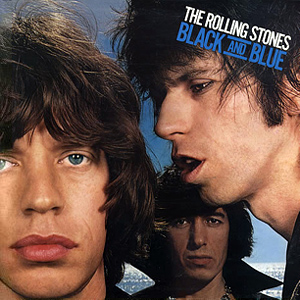This article relies largely or entirely on a single source .(November 2017) |
| "Time Waits for No One" | |
|---|---|
| Song by the Rolling Stones | |
| from the album It's Only Rock 'n Roll | |
| Released | 18 October 1974 |
| Recorded |
|
| Genre | Rock |
| Length | 6:38 |
| Label | Rolling Stones/Virgin |
| Songwriter(s) | Jagger/Richards |
| Producer(s) | The Glimmer Twins |
| It's Only Rock 'n Roll track listing | |
10 tracks
| |
"Time Waits for No One" is a song by English rock band the Rolling Stones from the 1974 album It's Only Rock 'n Roll . It was the first song recorded for the album.
Rock music is a broad genre of popular music that originated as "rock and roll" in the United States in the early 1950s, and developed into a range of different styles in the 1960s and later, particularly in the United Kingdom and in the United States. It has its roots in 1940s and 1950s rock and roll, a style which drew heavily on the genres of blues, rhythm and blues, and from country music. Rock music also drew strongly on a number of other genres such as electric blues and folk, and incorporated influences from jazz, classical and other musical styles. Musically, rock has centered on the electric guitar, usually as part of a rock group with electric bass, drums, and one or more singers. Usually, rock is song-based music usually with a 4/4 time signature using a verse–chorus form, but the genre has become extremely diverse. Like pop music, lyrics often stress romantic love but also address a wide variety of other themes that are frequently social or political.

The Rolling Stones are an English rock band formed in London in 1962. The first stable line-up consisted of bandleader Brian Jones, Mick Jagger, Keith Richards, Bill Wyman (bass), Charlie Watts (drums), and Ian Stewart (piano). Stewart was removed from the official line-up in 1963 but continued to work with the band as a contracted musician until his death in 1985. The band's primary songwriters, Jagger and Richards, assumed leadership after Andrew Loog Oldham became the group's manager. Jones left the band less than a month before his death in 1969, having already been replaced by Mick Taylor, who remained until 1974. After Taylor left the band, Ronnie Wood took his place in 1975 and continues on guitar in tandem with Richards. Since Wyman's departure in 1993, Darryl Jones has served as touring bassist. The Stones have not had an official keyboardist since 1963, but have employed several musicians in that role, including Jack Nitzsche (1965–1971), Nicky Hopkins (1967–1982), Billy Preston (1971–1981), Ian McLagan (1978–1981), and Chuck Leavell (1982–present).

It's Only Rock 'n Roll is the 12th British and 14th American studio album by The Rolling Stones, released in 1974. It was the last Rolling Stones album for guitarist Mick Taylor and the songwriting and recording of the album's title track had a connection to Taylor's eventual replacement, Ronnie Wood. The album also marked the 10th anniversary since the release of the band's debut album, The Rolling Stones. It's Only Rock 'n Roll combines the core blues and rock 'n' roll-oriented sound with elements of funk and reggae. It's Only Rock 'n Roll reached number one in the United States and number two in the UK.
Credited to Mick Jagger and Keith Richards, "Time Waits for No One" is a slower, smoother song than the ones for which the Stones are best known. The track features a distinctive groove that has been compared to the later song "Waiting on a Friend" (recording of which in fact started in late 1972). It is also noted for its distinct Latin influences.

Sir Michael Philip Jagger is an English singer, songwriter, actor, and film producer who gained worldwide fame as the lead singer and one of the founder members of the Rolling Stones. Jagger's career has spanned over five decades, and he has been described as "one of the most popular and influential frontmen in the history of rock & roll". His distinctive voice and energetic live performances, along with Keith Richards' guitar style, have been the trademark of the Rolling Stones throughout the band's career. Jagger gained press notoriety for his admitted drug use and romantic involvements, and was often portrayed as a countercultural figure.

Keith Richards is an English musician, singer, and songwriter, best known as the co-founder, guitarist, secondary vocalist, and co-principal songwriter of the Rolling Stones. Rolling Stone magazine called Richards the creator of "rock's greatest single body of riffs" on guitar and ranked him fourth on its list of 100 best guitarists in 2011, and the magazine lists fourteen songs that Richards wrote with the Rolling Stones' lead vocalist Mick Jagger on its "Rolling Stone's 500 Greatest Songs of All Time" list.

"Waiting on a Friend" is a song by the Rolling Stones from their 1981 album Tattoo You. Released as the album's second single, it reached No. 13 on the Billboard Hot 100 singles chart in the US.
The song opens with a riff by Richards which echoes throughout the rest of the song. Drummer Charlie Watts and Bill Wyman keep affected jazz beats. Song contributor Ray Cooper provides the song's distinctive driving percussions, including tambourine, maracas and a knocking beat that carries through the entire song like the sound of a ticking clock. Wyman also contributes an early use of synthesizer on a Stones track. Stones recording veteran Nicky Hopkins provides the song's swirling piano runs.

Charles Robert Watts is an English drummer, best known as a member of the Rolling Stones since 1963. Originally trained as a graphic artist, he started playing drums in London's rhythm and blues clubs, where he met Brian Jones, Mick Jagger, and Keith Richards. In January 1963, he joined their fledgling group, the Rolling Stones, as drummer, while doubling as designer of their record sleeves and tour stages. He has also toured with his own group, the Charlie Watts Quintet, and appeared in London at Ronnie Scott's Jazz Club with the Charlie Watts Tentet.

Bill Wyman is an English musician, record producer, songwriter and singer. He was the bass guitarist for the English rock and roll band the Rolling Stones from 1962 until 1993. Since 1997 he has recorded and toured with his own band, Bill Wyman's Rhythm Kings. He has worked producing records and films, and has scored music for film in films and television.

Raymond Cooper is an English musician. He is a session and road-tour percussionist, and occasional actor, who has worked with several musically diverse bands and artists including George Harrison, Billy Joel, Rick Wakeman, Eric Clapton, Pink Floyd and Elton John. Cooper absorbed the influence of rock drummers from the 1960s and 1970s such as Ginger Baker, Carmine Appice, and John Bonham. Incorporation of unusual instruments such as cowbells, glockenspiel, and tubular bells, along with several standard kit elements, helped create a highly varied setup.
The song's most noteworthy elements, however, are Mick Taylor's extended guitar solo and Jagger's lyrics. Taylor credits inspiration for the solo to a visit to Brazil following the Stones' European Tour 1973. Taylor's solo guitar piece carries the song to its conclusion.

Michael Kevin Taylor is an English musician, best known as a former member of John Mayall's Bluesbreakers (1967–69) and the Rolling Stones (1969–74). He has appeared on some of the Stones' classic albums including Let It Bleed, Get Yer Ya-Ya's Out!, Sticky Fingers and Exile on Main St..

The Rolling Stones 1973 European Tour was a concert tour of Great Britain and Continental Europe in September and October 1973 by The Rolling Stones.
Jagger's lyrics are a pastiche of complex observations and reflections. He speaks in the voice of a person learning the true meaning of life, that, as the title suggests, time waits for no one:
Yes, star crossed in pleasure the stream flows on by
Yes, as we're sated in leisure, we watch it fly ...
Drink in your summer, gather your corn
The dreams of the night time will vanish by dawn
AllMusic critic Stephen Thomas Erlewine described "Time Waits for No One" as having "aching beauty". [1] The song, though well regarded among the Stones' canon of work, has never been performed live and has appeared on only two compilation albums. The track appeared on the British compilation album Time Waits for No One: Anthology 1971–1977 , issued in 1979. This album was available on vinyl only (CDC59107) and has never been released on CD. Subsequently, the track was included on 1981's Sucking in the Seventies . This is a truncated version, with a running time some two minutes shorter than the original, and Taylor's solo faded out early.

AllMusic is an online music database. It catalogs more than 3 million album entries and 30 million tracks, as well as information on musical artists and bands. It launched in 1991, predating the World Wide Web.

Stephen Thomas ('Tom') Erlewine is an American music critic and senior editor for the online music database AllMusic. He is the author of many artist biographies and record reviews for AllMusic, as well as a freelance writer, occasionally contributing liner notes.

Time Waits for No One: Anthology 1971–1977 is a British-only compilation album by The Rolling Stones released in 1979. It covers the period from Sticky Fingers in 1971 until Love You Live in 1977. Only two of ten single A-sides from the period are included—"Angie" and "Fool to Cry".





